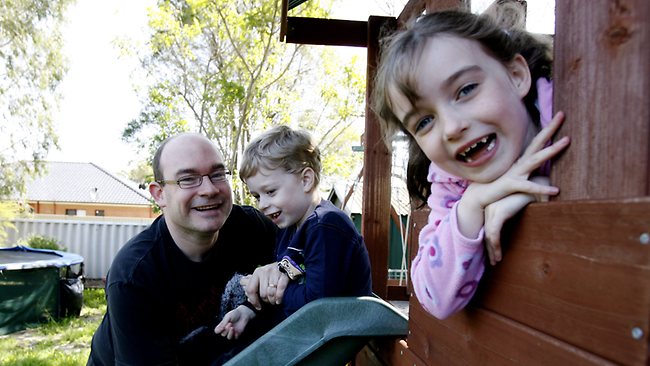
Clayton Bolger, with his autistic children, Lachlan and Alyssa, says to knock down some of the barriers would be 'amazing'. Picture: Marie Nirme Source: The Australian
RESEARCHERS have for the first time identified two biologically different strains of autism in a major breakthrough being compared with the discovery of different forms of cancer in the 1960s.
The findings, to be announced at an international autism conference in Perth today, are seen as a key step towards understanding the causes of autism and developing effective treatments as well as a cure.The findings bring hope that the communication, socialisation and other difficulties that autistic children experience can be tackled more easily and earlier.
Researchers from the University of California Davis's MIND Institute in Sacramento began the Autism Phenome Project in 2006. They have been studying the brain growth, environmental exposure and genetic make-up of 350 children aged between 2 and 3 1/2 years, and have so far found two biologically distinct subtypes of autistic brain development.
One group of children - all boys - had enlarged brains and most had regressed into autism after 18 months of age; another group appeared to have immune systems that were not functioning properly.
Throughout the 1960s, researchers identified different forms of cancer - for example, specific to the breast, lung and skin - which led to a better understanding of their causes and ultimately improved the manner in which they were treated.
Clayton and Rhona Bolger's two children - Alyssa, 6, and Lachlan, 4 - have been diagnosed with autism. Mr Bolger, of the Perth suburb of Maddington, said any help was welcome.
"To be able to knock some of the barriers down, almost circumnavigate them before they happen - like socialisation and communication - if those barriers are down before they even get to school or a peer group, that would be amazing," Mr Bolger said.
Psychiatry professor David Amaral, who led the MIND Institute's longitudinal study, said the findings could lead to more individualised treatment. "The ultimate goal is when a child comes into the clinic, rather than saying you just have autism, to be able to say you have autism type A, or type B, or type C," Dr Amaral said.
"And then based on that description, we would know whether there is a different treatment profile that we should recommend to the families.
"As an example, if a child has an immune form of autism, it may be that what we want to do is manipulate their immune system rather than trying something else that may be related to synaptic functions in the brain."
Families were currently presented with a vast array of treatments without necessarily knowing which worked.
"But if we can give them more information about what exactly is the causal process for their child's autism, then we can focus in on that and hopefully have a more productive intervention," he said.
Dr Amaral will present his team's research to the Asia Pacific Autism Conference today, in front of some of the world's leading autism researchers. He predicted there would be many more biological subtypes of autism identified just as there were many forms of cancer. "If we were trying to cure all cancer at the same time, it would be hopeless," he said. "Well, the same is true for autism. My guess is that there just isn't going to be a single diagnostic marker for autism - there's going to be a whole panel."
Bruce Tonge, emeritus psychiatry professor at Monash University, agreed that many subtypes of autism were likely to emerge.
"It has been for some time known that at least for some children with autism, their brains grow too rapidly in the first couple of years of life and then plateau out," Professor Tonge said.
"So further refinement of that knowledge will be important. Currently, a number of people are also looking for other possible environmental contributing factors, and the interaction between the environment and a person's immune system might be an interesting possibility there."
